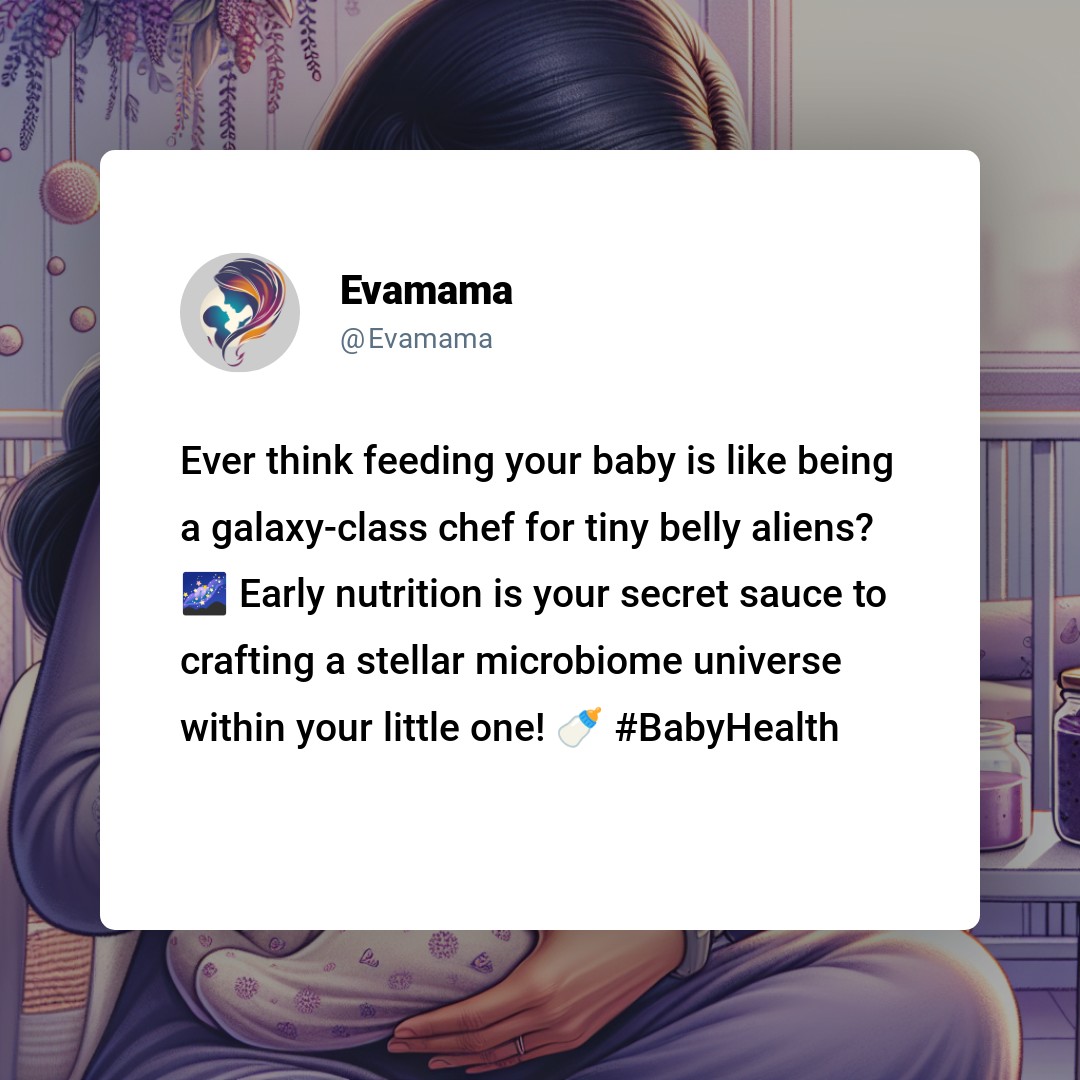Crafting Your Babys Microbiome: Early Nutritions Key Role
Early nutrition is pivotal in shaping your baby’s microbiome. It’s a hidden universe within your child that can influence their health for years to come. Imagine the microscopic world bustling inside your baby’s gut, a world that you have the power to nurture from their very first sip of milk.
This invisible ecosystem’s foundation is laid with each feeding choice, a decision that can feel as weighty as the nutritional future it sets. As a parent, I’ve navigated these waters, understanding the gravity of each meal’s impact on my child’s health.
Let’s embark on a journey to demystify how early nutrition can craft your baby’s microbiome, equipping you with knowledge to make informed decisions that foster a thriving internal garden from the start.

Crafting Your Baby’s Microbiome: The Impact of Early Nutrition

The First Sip: Breastfeeding and Microbiome Beginnings
Imagine the moment your newborn first latches on to breastfeed. This isn’t just a feeding; it’s the first installment in a lifelong health foundation. Breast milk is a cocktail of nutrients and beneficial bacteria that begins to colonize your baby’s gut, setting the stage for a robust microbiome. Studies show that breastfed babies often have a more diverse microbiome, which is linked to a lower risk of allergies and obesity later in life.
Formula Feeding: A Different Microbiome Map
If breastfeeding isn’t an option, formula feeding is a necessary alternative. Modern formulas are designed to mimic breast milk’s nutritional profile, but they can’t replicate the unique microbiome contributions. That’s why formula-fed babies may have a different bacterial composition. However, innovations in formula are constantly improving, with some brands adding prebiotics and probiotics to support gut health.
Mother’s Diet, Baby’s Bacteria
What you eat while breastfeeding influences your milk’s composition and, consequently, your baby’s microbiome. A diet rich in fruits, vegetables, and whole grains can enhance the quality of your breast milk. Nutritionists suggest that a varied diet not only provides all the necessary nutrients but also exposes your baby to different tastes and bacterial profiles.
Introducing Solids: A Microbial Milestone
The introduction of solid foods is a pivotal moment for your baby’s gut bacteria. This is when you can really influence their microbiome’s development. Introducing a variety of foods, especially those high in fiber, can promote a diverse bacterial environment. Pediatricians recommend starting with vegetables and fruits, then gradually including proteins and grains.
Timing Is Everything: When to Introduce What
The timing of introducing solids is just as required as the food choices. Introduce new foods one at a time and watch for reactions. Research indicates that introducing foods too early or too late could impact your baby’s microbiome and potentially their health. The sweet spot? Experts agree it’s around 6 months, but always consult with your pediatrician.
A Table for Two: Shared Meals, Shared Microbes
As your baby begins to eat solid foods, consider the family meal as a microbiome-building activity. Sharing meals exposes your baby to a variety of bacteria, especially if they’re eating the same healthy foods as the rest of the family. Studies have found that family-style meals contribute to a more diverse microbiome in children.
The Balancing Act: Nutrients for Mother and Baby
Both you and your baby need a balanced diet for optimal microbiome health. Important nutrients like omega-3 fatty acids, fiber, and antioxidants play a role in maintaining a healthy gut. Nutritionists emphasize the importance of a balanced diet for breastfeeding mothers to ensure that both mother and baby are getting what they need.
The Microbiome and Immunity: Building Baby’s Defenses
A healthy microbiome is your baby’s first line of defense against illness. The bacteria in their gut help train their immune system to recognize and fight off pathogens. Immunologists explain that a diverse microbiome is like a well-trained army, ready to protect your baby from infections.
The Long Game: Microbiome’s Role in Future Health
The microbiome your baby develops in the first few years can influence their health for years to come. Conditions like asthma, eczema, and even mental health issues have been linked to early microbiome composition. Longitudinal studies suggest that a healthy, diverse microbiome in infancy may reduce the risk of these conditions.
Nurturing the Microbiome Garden
Think of your baby’s microbiome as a garden that you’re helping to cultivate. Every feeding, every new food, is like planting a seed that will grow into a robust ecosystem. Gastroenterologists liken a well-tended microbiome to a flourishing garden, full of life and resilience.
By understanding the profound impact of early nutrition on your baby’s microbiome, you can make informed choices that will help them thrive. .
Crafting Your Baby’s Microbiome: The Impact of Early Nutrition

Imagine your baby’s gut as a garden, where the seeds of future health are sown. The right early nutrition can be the water and sunlight that nurture this garden, influencing your child’s risk of obesity, allergies, and immune-related conditions for years to come. Let’s study the profound effects of early nutrition on long-term health.
The Microbiome’s Role in Childhood Obesity Prevention
Did you know? The bacteria in your baby’s gut could be the unsung heroes in the fight against childhood obesity. Studies suggest that specific bacterial strains are necessary in regulating metabolism and energy balance. By adopting a diverse microbiome through breastfeeding and the introduction of varied solid foods, you’re setting the stage for a healthier weight trajectory.
Allergies and the Early Microbiome: Can We Reduce the Risk?
Allergies can be a distressing part of childhood, but early nutrition might hold the key to prevention. Introducing a wide range of foods, including potential allergens like peanuts and eggs, at the appropriate time could train the immune system to tolerate rather than react. This early dietary diversity encourages a robust microbiome, potentially offering lifelong protection against allergies.
Immune System Development: The First 1000 Days
The first 1000 days of life are critical for immune system development, and the microbiome plays a starring role. Beneficial bacteria contribute to the maturation of immune cells, helping to distinguish between harmless and harmful invaders. A diet rich in prebiotics and probiotics can support this process, promoting a balanced immune response and reducing the risk of autoimmune conditions.
Short-Chain Fatty Acids: The Unsung Heroes of Metabolic Health
Short-chain fatty acids (SCFAs) are produced when gut bacteria ferment fiber, and they’re like a superfood for your baby’s developing body. They not only fuel colon cells but also influence metabolism and the immune system. Feeding your child a fiber-rich diet supports the production of SCFAs, which could be pivotal in preventing metabolic diseases.
Lifelong Protection Against Disease: The Power of Early Nutrition
The notion that early nutrition could provide lifelong protection against certain diseases is not just hopeful thinking; it’s backed by science. By understanding the biological mechanisms at play, such as the role of the microbiome in nutrient absorption and immune function, you can make informed choices that may shield your child from chronic diseases later in life.
Understanding the Biological Mechanisms: Why It Matters
To truly grasp the impact of early nutrition, it’s required to understand the biological mechanisms at work. The microbiome’s influence on the immune system and metabolism is complex, but by learning about these interactions, you can appreciate the profound effects your dietary choices may have on your child’s future health.
Table: Key Microbiome Influencers and Their Long-Term Benefits
| Influencer | Benefit | How to Support |
|---|---|---|
| Breastfeeding | Diverse microbiome | Encourage exclusive breastfeeding when possible |
| Solid food introduction | Reduced allergy risk | Introduce a variety of foods early on |
| Prebiotic-rich diet | Enhanced SCFA production | Include fiber-rich vegetables and fruits |
| Probiotic foods | Balanced immune response | Incorporate fermented foods like yogurt |
By focusing on these key influencers, you’re not just feeding your child; you’re shaping their health destiny. .






